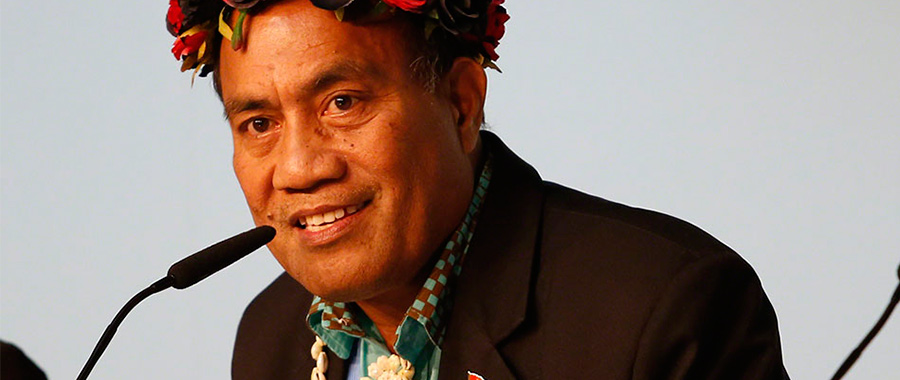The Bahá’í Faith, a world religion founded in the 19th century, has transcended geographical and cultural boundaries to touch lives across the globe. One remarkable instance that exemplifies this universality occurred when the President of Kiribati attended the Annual Bahá’í Convention. This momentous event not only signifies the leadership’s commitment to the principles of the Bahá’í Faith but also heralds a transformative shift in perspective for both the local populace and the international community. The implications of such participation extend far beyond the shores of Kiribati, inviting contemplation on the interconnectedness of humanity and the shared responsibilities we bear as global citizens.
The essence of Bahá’í teachings is encapsulated in the unshakeable belief in the oneness of humanity. This overarching tenet posits that all human beings, irrespective of their nationality, race, or religion, are fundamentally united. The attendance of Kiribati’s President underscores this profound principle. By engaging with Bahá’í teachings at such a level, the President not only endorses a philosophy rooted in altruism and service but also amplifies the relevance of these teachings in the modern world. This shift in perspective fosters an environment ripe for dialogue, cooperation, and mutual understanding among nations.
The Bahá’í Convention serves as a crucible for the exchange of ideas and an incubator for collective action inspired by the teachings of Bahá’u’lláh. Participants from diverse backgrounds congregate to share insights about the multifaceted challenges facing humanity. The themes discussed often revolve around social justice, environmental sustainability, and the importance of education. The presence of Kiribati’s President at such discussions augments the visibility of these critical issues, encouraging a global awakening to the pressing need for collaborative solutions. This is not merely a governmental presence; it is a declaration of intent, an assertion that Kiribati acknowledges and embraces its role within the larger narrative of human advancement.
Furthermore, the commitment of Kiribati’s leadership to attend the Annual Bahá’í Convention evokes curiosity regarding the unique socio-political and cultural milieu of the nation itself. Kiribati, an island nation scattered across a vast expanse of the Pacific Ocean, faces myriad challenges, including climate change, which threatens its very existence. The Bahá’í teachings offer invaluable insights that resonate deeply within this context. Eminent Bahá’í figures have consistently emphasized the harmonious relationship between humanity and the natural world. This philosophy is not merely theoretical; it lays the groundwork for pragmatic approaches to climate resilience and sustainability. As Kiribati grapples with these formidable environmental challenges, the application of Bahá’í principles may inspire innovative strategies that uphold the dignity of its people while safeguarding their environment.
The implications of the President’s attendance are twofold. On one hand, it reflects a commitment to ethical governance and social responsibility. On the other, it serves to awaken the curiosity of international observers regarding the potential for Bahá’í teachings to influence governance frameworks globally. The interplay between local actions and universal principles provokes an exploration into how such teachings might affect legislative endeavors, shaping policies that prioritize the welfare of citizens and the environment alike.
In addition to governance and environmental sustainability, education remains a focal point of Bahá’í discourse. The principles of the Bahá’í Faith advocate for universal education as a means of empowerment and enlightenment. The endorsement of this principle by national leaders, such as the President of Kiribati, fosters an environment where education is viewed not solely as a privilege but as an inherent right. As education becomes a priority, citizens are equipped with the knowledge and skills necessary to navigate the complexities of the modern world, paving the way for societal advancement.
Moreover, the participation of governmental leaders in such spiritual and community-oriented gatherings challenges the conventional dichotomy often drawn between religion and state affairs. It invites scrutiny into how moral philosophies can inform governance. Kiribati’s President attending the Bahá’í Convention is a testament to the potential for amalgamating ethical considerations into policymaking. This shift can tantalizingly reshape the narrative surrounding the role of spirituality in public life, suggesting that the infusion of ethical perspectives may lead to more just and humane governance.
In conclusion, the attendance of the President of Kiribati at the Annual Bahá’í Convention illustrates a significant paradigm shift in both local and global contexts. It encourages a fresh examination of the profound implications that Bahá’í teachings hold for governance, social justice, climate action, and education. This event not only promises to ignite curiosity among the international community but also fosters a reinvigoration of the belief in collective responsibility and the interconnectedness of humanity. As we traverse the complexities of contemporary existence, the principles espoused by Bahá’u’lláh beckon us to reconsider our individual contributions to a more equitable and united world. In a time marked by division, the path towards solidarity and understanding illuminated at this convention stands as a hopeful beacon, guiding both Kiribati and the world towards a brighter future.
